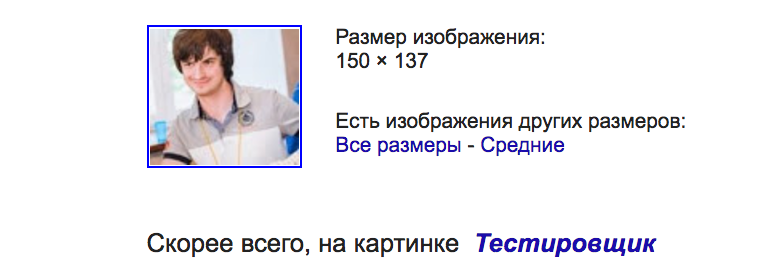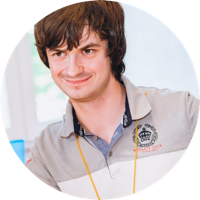“An interesting topic for discussion is the relativity of test coverage”: T-Systems about testing

At the conference, Heisenbag, in addition to the main program, will be a bonus from T-Systems : a small master-class employee German Vargin , already familiar to many testers from speeches at other conferences, will hold a booth at her stand (even Google Images understands it).
And on the eve of Heisenbag, we decided to learn more about the situation with the testing within the company, and asked questions to three of its employees: Herman himself, Andrei Pavlov (he is also known for his reports) and internal communications specialist Maria Zernovoy .
Maria Zernova
 - Last year you told us that in the St. Petersburg office of T-Systems with Java development - and in testing Petersburg is also very important for you? What projects are testing here?
- Last year you told us that in the St. Petersburg office of T-Systems with Java development - and in testing Petersburg is also very important for you? What projects are testing here?')
- Yes, testing is very important for our company, in St. Petersburg, about 50% of our employees are engaged in testing various projects and services of the company. Among our projects (there are more than 150 of them in Russia) there are projects for BMW, Swiss Railways (SBB), and testing is carried out by our teams locally. In addition, we have a direction that provides integration testing for more than 20 Deutsche Telekom systems. They constitute a single landscape and ensure the operability of the network of Deutsche Telekom, the largest telecommunications operator, our parent company. And we are planning to create a testing automation center that will provide services to the T-Systems concern worldwide.
- T-Systems has a Test School - has it been there for a long time? Are there many employees in T-Systems that got into the company thanks to it?
- The school has existed since 2011. During this time more than 200 people graduated from it, and at least 130 work for the company in various positions. Some have already become teachers in the new Test School sets, some lead teams in the role of test managers. Now we are finishing the anniversary 25th school, and in August a new set will start.
German Vargin
 - What are you working at T-Systems? And, since you are interested in the topic of certification testers, tell me at the same time, what certificates do you have?
- What are you working at T-Systems? And, since you are interested in the topic of certification testers, tell me at the same time, what certificates do you have?- I am a leading expert in testing in one of the T-Systems projects. We develop software for our customers in Germany. Additionally, I conduct various courses in our company. I have developed several courses for staff at various levels, and sometimes I conduct a group to prepare for the ISTQB Advanced exams. I have several ISTQB certificates:
- ISTQB Certified Tester, Foundation level (2013)
- ISTQB Certified Tester, Advanced Level - Test Analyst (2015)
- ISTQB Certified Tester, Advanced Level - Technical Test Analyst (2015)
- ISTQB Certified Tester, Advanced level - Test Manager (2017)
- How does certification affect working at T-Systems? For example, does it matter for customers that their product be tested by certified specialists, or is it only important for them “so that there are no bugs”?
- At T-Systems, everyone is very positive about certification. Moreover, any initiative for the training and development of specialists is always supported by the company. The customer in the project where I work is a certified testing specialist himself. Therefore, he trusts his colleagues with certificates, speaks the same language with them, and more entrusts interesting tasks requiring an integrated approach to solving. Of course, not all projects have this situation. But I feel that having proven knowledge helps us open different doors in T-Systems.
- You teach at T-Systems Test School - but does this teaching help in the main work? Does it turn out that you yourself start to understand something important?
- An interesting question and relevant to me. Recently, I have devoted a lot of time to teaching at T-Systems. At Test School, I run an XML course for university graduates who are just starting their way to IT. Our company is constantly looking for professionals who are fluent in German. Today, there are practically no such people on the market. Therefore, it is sometimes faster and easier to find intelligent "philologists" with the German language and teach them to test well. It turns out that it is much easier than forcing a techie to learn German. Accordingly, in our school, I learned to literally use fingers to explain to people what XML is, web services, and so on. I often use these communication skills when working with our clients when I need to explain various technical details to our business partners in simple language.
Returning to the main topic of the question, I refer to my ISTQB course. When I prepared all the presentations and sorted out the tasks for the first group, I realized that I was ready for the exam much better than on the day when I passed it. So of course it helps. The more often I work with these or other technologies, the better it will be for me, and the easier and faster it will be to apply all this in real project tasks.
- You have previously made reports on various topics - from project transition to another testing team, to, on the contrary, the organization of the testing process from scratch. And working in T-Systems, where there are many different customers and projects, usually means changing different situations? Or, in many cases, the tester has been working on one favorite project for a long time?
- Yes, there are enough such cases. I know colleagues at T-Systems who have been working in the same project for over 10 years on testing a favorite product. I think it all depends on the person and his goals. I myself have been working in my current project for 5 years, and I still have tasks that I took over from my German colleagues in 2012. At the same time, I try to fit into all the additional activities that T-Systems offers me. My reports are based on my personal experience that I received at T-Systems. First, we completed the transfer of the project from Germany to Russia. Then, when we won the trust of the customer, he immediately entrusted us with testing absolutely new products. Now our team is expanding, the number of systems for which we are responsible is increasing, and fundamentally new tasks are constantly emerging.
- Can you, as a person with extensive testing experience in an outsourcing company, say what are the peculiarities in comparison with the grocery ones - at least technical, even organizational?
- My career is made up of just the outsourcing experience, so I can only guess about the grocery ones.
In the outsourcing companies there are always a lot of intermediate links between those who receive the final product and those who develop it. These are analysts, those. designers, architects, a number of managers and so on. It often happens that developers and testers, due to the nature of the process, cannot communicate with end customers. Developers do not understand business, business is not interested in technical risks, and so on. Accordingly, a lot of time is spent on the coordination of requirements, various discussions, bringing to a certain level of quality and the time before the release of a product into release increases significantly. But the quality of products is always high. I think that in food companies, time is the deciding factor. If there is an idea how the product can be changed, then a decision is quickly made whether it is worth doing it or not. And if so, the new version goes into production as quickly as possible.
From a technical point of view, I think there is no difference. I heard there is an opinion that food companies are more “sick” for their products. But I disagree with that. At T-Systems we are constantly working to better understand the business. We try to test more thoroughly with each release, introduce new tools, increase coverage. Every time I go to the T-Mobile store in Germany to buy a SIM card, I have very warm feelings when I see software that we tested in St. Petersburg.
- You will hold a master class at the T-Systems booth at Heisenbag - but what exactly are you talking about?
- I had a topic for the report related to the relativity of the test coverage. Unfortunately, I did not have time to submit a report because of the project load and business trip. In my project, overseas customers unexpectedly became well versed in testing. They are increasingly making reviews of our test cases and constantly put forward new requirements. Sometimes you can see the requirements in the spirit of "You need to make 100% coverage of functional requirements." We all know that absolutely we can not check. Therefore, such tasks can be approached differently, perform a different number of tests and find completely different errors. I think this is an interesting topic for discussion. The master class will last about 15 minutes, and we will analyze several business scenarios on it, write test cases that will provide the maximum test coverage for these scenarios.
Andrey Pavlov
 - In testing, you participated as a tester, and as an analyst - and at the moment, what is your role in T-Systems?
- In testing, you participated as a tester, and as an analyst - and at the moment, what is your role in T-Systems?- At present, I am Test Team Lead in the TSO Process Test project, which deals with the quality assurance of the Deutsche Telekom systems, which are responsible for one of the main activities of the concern - providing high-speed Internet, telephone and digital television services to its customers.
In addition, I am the head of the internal training project of the company, helping our specialists to grow and become real experts in the field of testing.
- How does the fact that you have experience and testers, and analyst? Do you feel that seeing the picture on both sides gives you a fundamental advantage?
- Of course, the more different angles from which you can look at the situation, the more widely visible the picture as a whole. However, most of the projects in T-Systems have a separate team of analysts who work with requirements and always provide accurate and detailed specifications. This approach is extremely useful, because testing should be as independent as possible from the development processes (not only directly programming the product, but also from developing the requirements): if the tester combines two roles, he inevitably loses some of objectivity.
- In addition to these two incarnations, previously you were also a developer - and how does this experience affect now?
- As in the previous case, when you know the specifics of the development process from the inside, it brings benefits. Not to mention the obvious possibilities to use white-box testing techniques, understand the code and be able to change it, at least in your local environment to find defects. This makes the communication process simpler, the importance of which, I think, everyone understands. It is always easier to communicate when the developer understands that he does not need to explain on the fingers how this or that functionality is implemented, and you can immediately get to the point.
The same with the work of the analyst - when you can immediately communicate with the customer, without additional consultation with the developers, explain the features of the current architecture. It will be difficult and expensive to add functionality that interests him. And to offer other options that can suit the customer, and they will be easy to implement and implemented in the programming patterns adopted on the project.
- You previously had a report on the EARS approach, which allows to improve the language of requirements - and how actively are you now using in the T-Systems projects in which you participate?
- At the moment I do not work with the requirements, so I don’t use this interesting technique, however, at the conferences that have passed since that time, the audience approached me and told me about their experience in using EARS, how it helped them to optimize the process and how much documentation was reduced while maintaining semantic fullness.
“You also talked about combinatorial testing in mobile development, mentioning difficulties when the zoo of Android devices is also multiplied by the number of other parameters. And how does T-Systems choose the initial set of smartphones for testing - does it always depend on the customer, or do you have a standard set of models that you consider representative enough for most cases?
- Initially, of course, it depends on the customer. From the budget that he is willing to spend and the quality that he wants to receive. Experts from the side of testing can offer a certain set of devices, based on, for example, statistics on their use and inform about the risks that may arise if you do not test the application on other devices. However, combinatorial testing can be used not only to determine the set of phones and their attributes. Now my current project is discussing the introduction of this approach for, for example, defining the products that we use in the TSO Process Test to get the maximum coverage of options with the minimum number of tests.
Source: https://habr.com/ru/post/330122/
All Articles